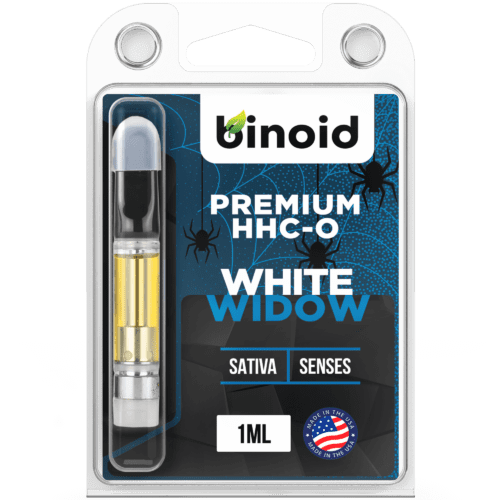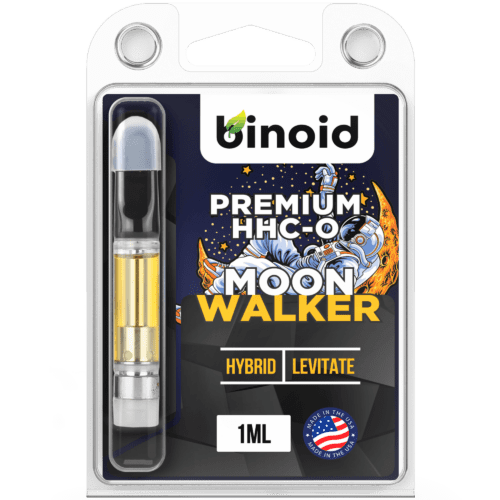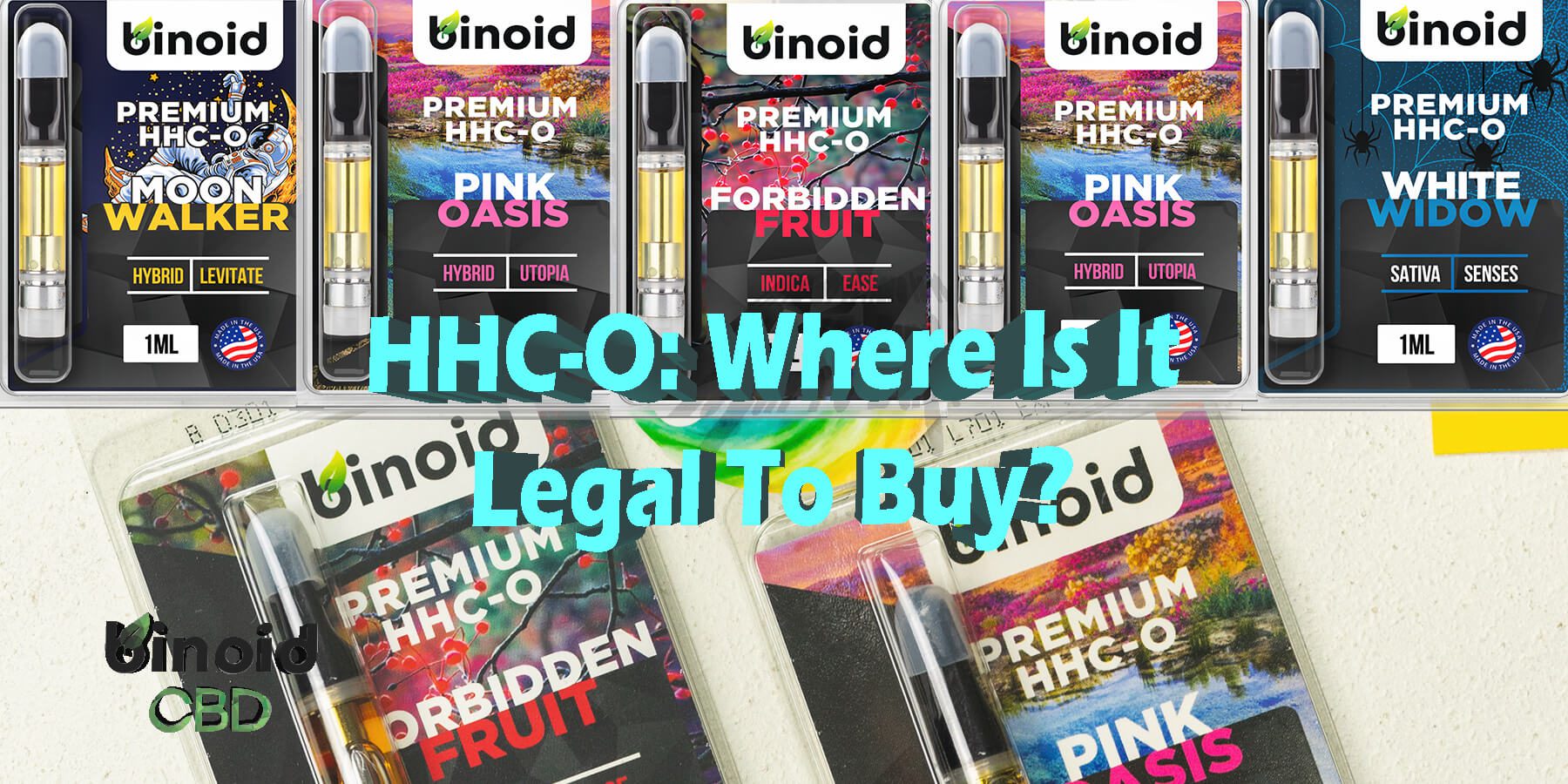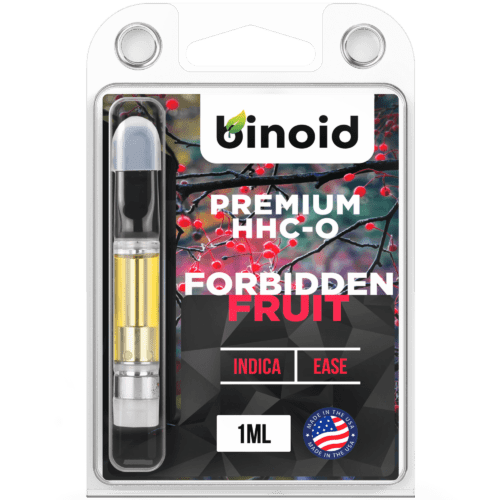HHC-O-acetate (HHC-O) is a totally new cannabinoid to enter the market, and it’s creating quite a stir already. How? By promising a more powerful HHC experience, with about 1.5x the potency, while being even more comparable to delta 9 THC in terms of its various effects.
Naturally, a lot of people are eager to get their hands on it as it makes its way onto the already-thriving hemp market. But, as we must ask ourselves with each new cannabinoid, is HHC-O and HHCO products actually legal, both on a federal level, and in all 50 states?
To buy HHC-O Products Click Here
-
Product on sale
 HHC-O Vape Cartridge – White Widow$30.99
HHC-O Vape Cartridge – White Widow$30.99$69.99
Is HHC-O Federally Legal?
Just like HHC, delta 8 THC, delta 10 THC, THC-P and other recent additions to the hemp market, HHC-O is federally legal thanks to the Farm Bill which passed in 2018. This legislation simply legalized hemp and all hemp derivatives that contain no more than 0.3% delta 9 THC. As HHC-O is not delta 9 THC, it can legally exist in any product type with no restriction on concentration. Basically, there are no laws federally that prohibit HHC-O in any sort of way.
Is HHC-O Legal in All 50 States?
While HHC-O-acetate is federally legal, not all states align with this. Each state is free to make certain derivatives of cannabis illegal within their borders, as we know with the small number of states that have banned delta 8 THC.
Now, HHC-O-acetate is too new for state legislators to single it out in any way. But, states that have banned delta 8 THC have generally banned all psychoactive hemp derivatives, so it should be assumed that HHC-O is illegal in those states as well. That being said, you can find your state on the list below.
- Alabama: HHC-O is legal in Alabama
- Alaska: HHC-O might be illegal in Alaska
- Arizona: HHC-O might be illegal in Arizona
- Arkansas: HHC-O might be illegal in Arkansas
- California: HHC-O is legal in California
- Colorado: HHC-O might be illegal in Colorado
- Connecticut: HHC-O is legal in Connecticut
- Delaware: HHC-O might be illegal in Delaware
- Florida: HHC-O is legal in Florida
- Georgia: HHC-O is legal in Georgia
- Hawaii: HHC-O is legal in Hawaii
- Idaho: HHC-O might be illegal in Idaho
- Illinois: HHC-O is legal in Illinois
- Indiana: HHC-O is legal in Indiana
- Iowa: HHC-O might be illegal in Iowa
- Kansas: HHC-O is legal in Kansas
- Kentucky: HHC-O is legal in Kentucky
- Louisiana: HHC-O is legal in Louisiana
- Maine: HHC-O is legal in Maine
- Maryland: HHC-O is legal in Maryland
- Massachusetts: HHC-O is legal in Massachusetts
- Michigan: HHC-O is legal in Michigan
- Minnesota: HHC-O is legal in Minnesota
- Mississippi: HHC-O might be illegal in Mississippi
- Missouri: HHC-O is legal in Missouri
- Montana: HHC-O might be illegal in Montana
- Nebraska: HHC-O is legal in Nebraska
- Nevada: HHC-O is legal in Nevada
- New Hampshire: HHC-O is legal in New Hampshire
- New Jersey: HHC-O is legal in New Jersey
- New Mexico: HHC-O is legal in New Mexico
- New York: HHC-O might be illegal in New York
- North Carolina: HHC-O is legal in North Carolina
- North Dakota: HHC-O is legal in North Dakota
- Ohio: HHC-O is legal in Ohio
- Oklahoma: HHC-O is legal in Oklahoma
- Oregon: HHC-O is legal in Oregon
- Pennsylvania: HHC-O is legal in Pennsylvania
- Rhode Island: HHC-O might be illegal in Rhode Island
- South Carolina: HHC-O is legal in South Carolina
- South Dakota: HHC-O is legal in South Dakota
- Tennessee: HHC-O is legal in Tennessee
- Texas: HHC-O is legal in Texas
- Utah: HHC-O might be illegal in Utah
- Vermont: HHC-O might be illegal in Vermont
- Virginia: HHC-O is legal in Virginia
- Washington: HHC-O is legal in Washington
- West Virginia: HHC-O is legal in West Virginia
- Wisconsin: HHC-O is legal in Wisconsin
- Wyoming: HHC-O is legal in Wyoming
Note: Be aware that state laws regarding different hemp-derived cannabinoids can change at any time, often without any warning to either business owners or consumers. Therefore, while this article reflects the present legality of HHC-O-acetate, you’ll want to cross-check with the latest news in your state regarding the hemp market.
-
Product on sale
 HHC-O Tincture – 1000mg$30.99
HHC-O Tincture – 1000mg$30.99$79.99
The FDA’s Role In HHC-O Acetate
Presently, the FDA has not yet regulated hemp products, even though they are legal. What this means is that there could come a time when the FDA creates its own guidelines on FDA that are technically not part of state or federal law. At the moment, hemp products are sold in an unregulated market, which means that companies can essentially do whatever they want when producing hemp-based goods.
This is largely why we have such an enormous selection of product types to choose from when looking for CBD and other hemp derivatives. This means that for the time-being, you can legally buy HHC-O products (assuming that it is legal in your state) that has not been created with industry regulations. This is a good thing in that it gives us a wider variety of products to choose from.
But, it also means that you have to be careful when making a purchase, to know for a fact that what you are getting is not just legitimate, but also high in quality and free of impurities and toxic substances that dilute the product formula.
The DEA and Hemp Companies
The United States Drug Enforcement Agency (DEA) is known to change their minds regularly, and many hemp companies producing hhco products have been on pins and needles wondering whether or not their operations will get shut down due to a sudden change in legal status.
The problem with hhco is that it’s becoming more popular, which is good for companies, but also draws more attention to the compound, which can lead to more attention from the DEA themselves. If they decide that HHC-O is becoming a social concern, they may end up putting it on the list of controlled substances, which would harm hemp companies that are simply complying with the law by deriving hhco from hemp through completely legal means according to the 2018 Farm Bill.
The Farm Bill does explicitly state that all hemp cannabinoids are legal. However, the DEA is often capable of overriding federal law on a whim. The DEA though may wrongfully accuse hemp companies of making synthesized HHCO, as the methods used to produce it could be mistaken for ones that rely on synthetic means. This is why hemp companies are already preparing to defend themselves. Ultimately, the extraction methods used are natural-based, meaning that they do not result in synthesized THC in any way.
Can HHC-O Result in a Failed Drug Test?
Now, let’s get back into the practicalities regarding HHC-O. One question that we’ve been getting ever since CBD hit the scene is whether or not hemp can cause you to fail a drug test. Well, here’s where it gets interesting. Hemp as a whole, in the form of flower or full spectrum hemp, will not usually cause a failed drug test. This is because the amount of THC, including both delta 8 and delta 9, is so low in hemp that it won’t even register.
However, HHCO is different chemically than regular THC. Therefore it is possible it will not show up. On the other side, We also stay on the side of caution. This means I would act as if HHC-O products will trigger a drug test. Whether if it actually does or not.
-
Product on sale
 HHC-O Vape Cartridge – Moon Walker$30.99
HHC-O Vape Cartridge – Moon Walker$30.99$69.99
How HHC-O Products Are Made
To take the hemp plant and produce from it HHC-O concentrate, companies can choose a few different ways.
Method #1:Extraction
Manually isolating the HHCO compound from the hemp’s composition and extract it to create a concentrate. As you can imagine, extracting a compound that is present in less than 0.1 percent of the plant’s entire makeup is tedious and expensive, because an enormous amount of plant material must be used to produce a fair amount of extract.
Method #2: Rearranging Compounds
Becoming increasingly popular and a bit more complex, although less expensive overall. HHC-O can be made with an extensive process similar to what it takes to make THCV.
Companies have found ways to rearrange these atoms in order to turn hemp compounds into delta 8 and other compounds. What’s unique about this process is that it’s also much more “sound” in terms of its legality. CBD is known to be a largely safe substance, and by using molecular chemistry to turn it into HHCO, you’re helping to break the association to delta 9 THC.
Can HHC-O Be Discovered on a Lab Test by Law Enforcement?
Another concern that many have is that HHCO may be read if analyzed by a lab. Let’s say a cop pulls you over and discovers your HHC-O vape oil. Then, they confiscate it and test it to see whether or not it’s legal. Again, as stated before, because HHCO and HHC-O products are not a THC that means it will likely not spike anything on a drug test.
For now, it looks like you can carry HHC-O products without worry. However, this does not mean using the products irresponsibility. Still do not operate machinery after taking HHCO.
Guide for Using HHC-O Legally
Naturally, if you’re going to seek out HHC-O-acetate, you’ll want to do so without risk of breaking the law. Here’s how to acquire this compound and use it in a way that’s not going to be legally risky.
#1: Make Sure Your State Allows It
As we said above, it’s very important to make sure that HHC-O-acetate is legal in your state. Otherwise, you may get into a lot of trouble should you purchase or possess it. Check on your state’s hemp laws periodically and note that if your state has recently banned delta 8 THC, there is a good chance HHC-O has also been banned, so look at the actual bill to figure out the specifics of your state’s new laws.
#2: Ensure It’s Hemp-Derived
HHC-O is only classified as federally legal if it comes from the hemp plant, because marijuana and its various derivatives remain illegal under federal law. This means that you can only legally purchase HHC-O-acetate if it comes from hemp. The good news is that at Binoid, we strictly carry hemp-derived products, including our HHC-O, which is federally compliant in every way.
#3: Find Out the Production Method Used
Currently, the FDA does not prohibit certain types of extraction methods that are used to produce HHC-O products. But, you should consider the extraction method used by a company for your own safety. HHC-O-acetate is, by nature, lab-created, as it consists of pure, hemp-derived HHC-O which has been converted into an acetate. Find out how a company makes their HHC-O to ensure they aren’t sneaking unsafe additives into the process.
#4: Look for a Lab Analysis
All hemp products, including those that contain HHC-O-acetate, must undergo a third-party testing process carried out by an unbiased, state-authorized hemp analysis laboratory. This provides objective information about the federal compliance of a product, along with its safety profile as it detects impurities, microbes and contaminants. Always look for these lab reports on a company’s website to know that what you’re getting is genuine and high in quality.
#5: Be Mindful of Where and When You Use it
Even if your state allows you to buy and use HHC-O-acetate, you need to make sure that you’re responsible with it. Driving under the influence of any intoxicating substance is illegal, so be mindful of this when the cannabinoid is in your system. Further, it may be smart to only use HHC-O at home, since law enforcement officers may assume that what you’re using is marijuana, since it can be hard to tell the difference without a thorough analysis.
In Closing
HHC-O-acetate and HHCO products really is an exciting addition to the hemp market, and the good news is that it’s fully legal for the large majority of Americans. If you’ve determined that the cannabinoid is legal in your state based on the list above, we encourage you to explore the federally compliant, lab-tested HHC-O at Binoid.
To buy HHC-O Products Click Here\
-
Product on sale
 HHC-O Vape Cartridges – Bundle$99.99
HHC-O Vape Cartridges – Bundle$99.99$199.96



